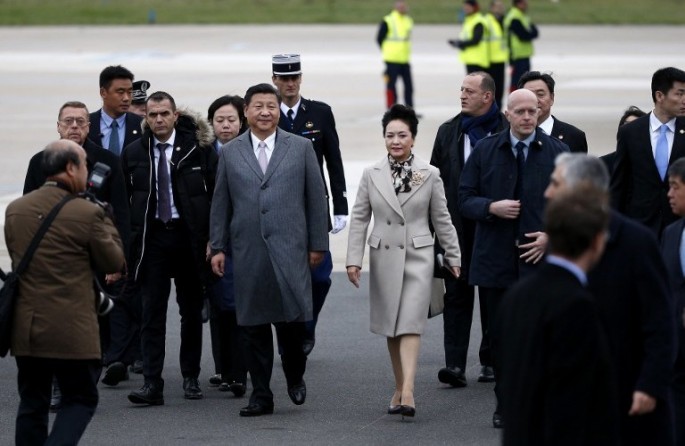Chinese President Xi Jinping arrived in Paris on Sunday to attend the opening ceremony of the U.N. Climate Change Conference.
Xi, accompanied by his wife Peng Liyuan and other senior officials, landed in the French capital for a two-day visit as guest of French President Francois Hollande and Laurent Fabius, France's foreign minister and chairman of the Conference of the Parties (COP21) to the United Nations Framework Convention on Climate Change (UNFCCC), according to a report from Chinese state broadcaster CCTV published on Sunday.
The Chinese president will deliver a speech at the conference on Monday, showcasing China's "views and propositions for the governance of the global climate change," the report said.
Xi is also scheduled to have a working dinner with President Hollande and hold talks with U.S. President Barack Obama on the sidelines of the conference to discuss the climate issue and bilateral relations.
It will be the first time for China's top leader to attend the U.N. climate conference.
David Gosset, founder of the Euro-China Forum, said that China is a unique situation in the climate negotiations and is pushing for a successful outcome in the conference.
"Beijing indeed reconciles the positions of the developing countries and of the developed countries. It connects the preoccupations of the South and the concerns of the North," Gosset told the Global Times on Sunday.
The U.N. Climate Change Conference in Paris, which is expected to draw in world leaders and representatives from 195 countries, is the latest attempt to cut down on carbon emissions through a legally binding treaty after a previous deal in Copenhagen failed to materialize in 2009.
The Chinese government has earlier expressed hopes that a deal can be reached at the Paris conference that is both "powerful, ambitious, and legally binding."
"Climate change is a global challenge at which no country can stand on their own," Xi said in a written interview with Reuters in October. "Developed and developing countries have different historical responsibilities for climate change, and different development needs and capabilities."
The Chinese president added that China is ready to play a constructive role and work for the timely conclusion of a comprehensive, balanced and strong agreement at the Paris conference.
China has pledged to cap its carbon emissions around 2030 and is set to establish a national carbon trading system by 2017. The country is currently the largest renewable market in the world.
According to a proposal on the 2016-2020 Five-Year Plan for national economic and social development, China has set a target to promote clean industrial production, low carbon development and energy conservation to ensure sustainable growth in the near future.
The government also pledged to help other developing countries affected by global warming. During a state visit to the U.S. in September, Xi unveiled plans to establish an independent South-South cooperation fund of 20 billion yuan ($3 billion).
"By signing an agreement with the United States on environment, through the careful preparation of the COP21 and by the presence in Paris with other world leaders at the beginning of what will be a complex negotiation, President Xi demonstrates that China is a globally responsible power," Gosset said.



























